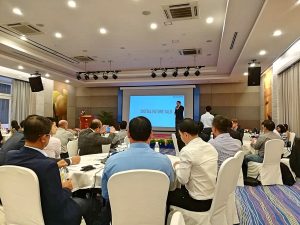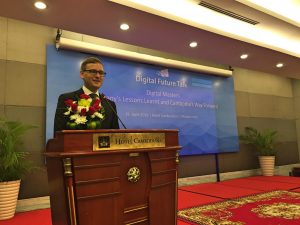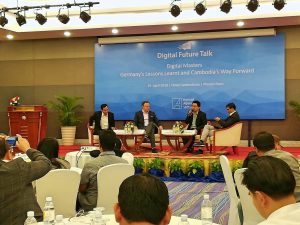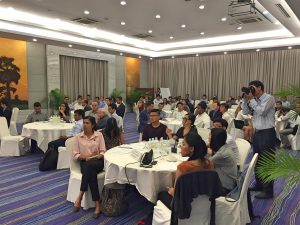Digitalization affects us all – ODC attends conference hosted by Konrad Adenauer Stiftung
“When I first arrived in Cambodia, I was impressed of the digitization process here,” Dr. Daniel Schmücking remembers his first days in Phnom Penh, and continues: “I thought ‘how can I survive here?’ but then someone told me about PassApp.” The Konrad Adenauer Stiftung (KAS) country representative introduced the conference “Digital Masters – Germany’s Lessons Learnt and Cambodia’s Way Forward” with this anecdote which for him illustrates how digital applications make people’s lives easier.
The conference hosted by the German KAS attempted to build a bridge between Germany and Cambodia – two countries that will be highly affected by the process of digitization – each country in its own way. In Germany, established businesses like car companies must adapt their production processes and products. According to Prof. Dr. Mario Voigt, professor at the Quadriga University Berlin, Germany wants to be the ‘hero’ of the platform economy. The model he developed to transform the Western European economy towards digitization includes four fields of action: digital data, connectivity, digital customer access, and automation. For businesses it will be crucial to improve in these fields to remain competitive in a global market. Dr. Voigt illustrated this claim with an example from Germany: “There is a small company from the black forest in Germany that produces cuckoo clocks – a traditional German product. In Germany, it’s a dying industry. But this company found that people in the US and in Singapore really love those clocks and now they use targeted ads to promote them in these two countries.” For Voigt, this story demonstrates that digitization not only affects big companies but also small enterprises.

Dr. Mario Voigt giving a presentation on “Germany’s Lessons Learnt – Policies, Leadership and Capabilities to embrace New Technologies”.
At the end of his presentation, Dr. Voigt explained Germany’s efforts to become a modern digital economy. The digitalization expert, who is also a politician for the ruling conservative party CDU, claims that the government plans to invest approximately 6 billion dollars for digital infrastructure and recently introduced a new chief digital officer on the national level. On a final note, he bridged to the situation of Cambodia: “I think you need a strategy like Germany because the future will bring change anyways and with a strategy you can better adapt to it. There is a future out there that’s going to bring a lot of chances!”
The following panel discussion about the Cambodian digital ecosystem was attended by, among others, Mr Sun Rapid, Vice President of the National Institute of Posts, Telecommunications and ICT. He presented Cambodia’s ICT masterplan 2015-2020 claiming that the government wants to promote ICT literacy and start-ups, and is in the process of preparing policies regarding broadband and digital businesses: “We want to attract big companies like Microsoft or Google to have offices in Cambodia.” Asked about privacy and data protection policies Mr. Rapid responded that Cambodia is still in an early stage: “We still think about how to ignite the digitization process in Cambodia. We have to work on the foundation first.” Prof. Dr. Voigt replied to this statement and criticized this approach to set-up businesses first and to put privacy second. Instead, those processes had to take place simultaneously: “You have to find a solution for privacy and data regulation in Cambodia as we did in Germany!”
The KAS’ goal to create a platform for exchange where both countries can learn from each other has been achieved. The half-day conference was a great opportunity for the participants to learn about Germany’s progress and Cambodia’s development in the digital world. In the future, a better inclusion of women would be desirable. The organizers of the event explained the lack of female panelists by last-minute cancellations. In addition, a stronger focus on citizens’ perspective – rather than a business perspective – would have been interesting – especially regarding the changes for labor in a digitalized world. This event was the first of its kind hosted by the KAS and will probably be repeated in the future.




